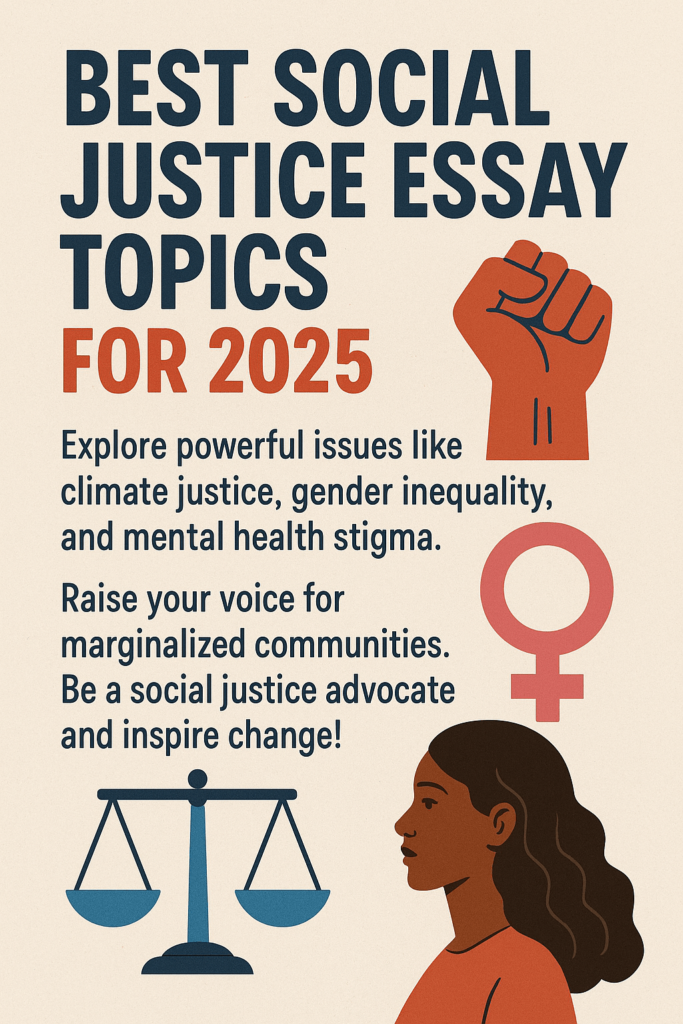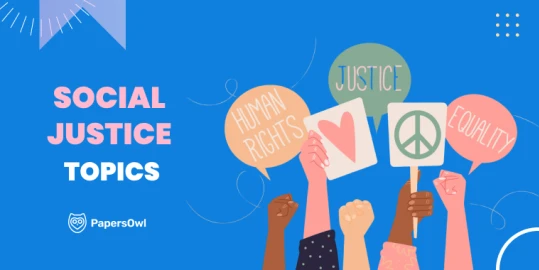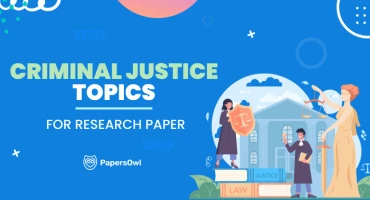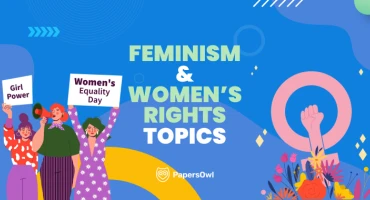Social justice matters to all of us. It’s about fairness, equal rights, and ensuring everyone is respected.
In this regard, education plays a big role in helping students understand these issues. By learning and researching, students gain a deeper awareness of social justice problems that affect real people. Schools and colleges can help build informed minds ready to stand up for change.
Writing about social justice topics for students isn’t just a class task. It can open your eyes, shift perspectives, and inspire others to act. This guide is full of strong and simple ideas to help you start.
If you’re looking for social justice essay topics or want help from assignments writers choosing a good one, you’re in the right place.
What Is Social Justice?
Social justice means fairness for everyone. It ensures that all people have equal rights and chances in life, including access to education, healthcare, jobs, and freedom.
The main ideas of social justice are:
- equality;
- human rights;
- inclusion;
- dignity.
Social justice works to stop discrimination and unfair treatment. It helps people who are often left out or not heard. These are usually marginalized communities — groups that don’t have the same power, voice, or access as others.
Additionally, a social justice advocate speaks up for these groups. They fight for equal treatment and better opportunities for everyone. Social justice is about creating a fair and caring society where no one is left behind.
10 Current Social Justice Issues for Students to Understand
Social justice is more than just a big idea. It’s about real problems that affect real people every day. Here are 10 important social justice issues all students should know:
- Systemic Racism.
Racism isn’t just one person’s bad opinion. It’s built into systems like schools, jobs, housing, and the legal system. Marginalized communities often face unfair treatment. Fighting systemic racism means making sure everyone gets treated fairly.
- Climate Justice.
Climate change doesn’t hurt everyone the same way. Poor communities and rural areas often suffer the most from extreme weather events. Climate justice means protecting the Earth and ensuring no group is left behind.
- Gender Inequality.
Women still don’t have full equality in many places. The gender wage gap shows that women are often paid less than men for the same work. Gender inequality also shows up in education, healthcare, and leadership.
- Mental Health Stigma.
Too often, people feel embarrassed to talk about mental health. This mental health stigma can stop them from getting the help they need. Mental health is just as important as physical health.
- Discrimination Against LGBTQ+ Communities.
Many LGBTQ+ people still face hate and unfair laws. This affects their safety, jobs, and happiness. Social justice movements work hard to make sure LGBTQ+ communities are accepted and protected.
- Problems With Access to Education.
Not everyone has the same chance to go to school. Some kids in marginalized communities or poor areas miss out on a good education. Moreover, even higher education can be too expensive for many. Fair access to learning must be a basic human right.
- The Digital Divide.
These social issues essay topics are becoming more and more popular nowadays. Technology can change lives, but not everyone can access it freely. Nowadays, many students don’t have computers or the Internet at home. This digital divide creates unfair gaps in learning and future jobs.
- Police Brutality.
Some police treat people unfairly, especially in marginalized communities. Police brutality and racial profiling are big problems that hurt trust and safety. Many social justice advocates are working to reform the system.
- Homelessness Crisis.
More families are losing their homes. The cost of living is too high, and many can’t find safe places to live. The homelessness crisis is a deep social injustice that hurts adults and children.
- Food Insecurity.
Many families still worry about their next meal. Food insecurity affects health, learning, and happiness. Food banks try to help, but the real solution is fixing the deeper causes, like income inequality and low wages.
Learning about these problems can turn students into real social justice advocates. Through writing, research, or speaking out, students can help fight social injustice and bring positive change to our world.
120+ Social Justice Essay Topics for Students

Education and Social Justice Issues Examples
- Should college be free for everyone?
- How does income affect school funding?
- Do private schools increase inequality?
- Making classrooms more inclusive for students with disabilities
- Why must college be easier to access?
- Teachers as voices for social justice
- Is standardized testing fair to all?
- School access in rural communities
- Racial bias in school punishments
- Technology gaps in learning
- Unfair school lunches in poor areas
- Access to special education in public schools
- Immigrant students and language barriers
- Graduation rates and race
- Is college admission fair for marginalized students?
Environmental and Climate Justice
- How climate change hurts poor communities
- Should schools teach climate change?
- Who lives near toxic waste?
- How does plastic waste harm the poor?
- Global warming and food problems
- Indigenous voices in climate justice
- Clean water access in low-income areas
- Air pollution and community health
- Extreme weather and housing problems
- Clean energy jobs and fairness
- Hot cities and poor neighborhoods
- Rising seas and island countries
- Fast fashion and the planet
- Cutting down forests and native rights
- Climate change and global health risks
Economic Inequality and Labor Rights
- Why does the racial wealth gap exist?
- Is gig work stable and fair?
- Why does the gender pay gap still matter?
- Worker rights and labor unions
- Minimum wage vs. living wage
- What does wage fairness really mean?
- Are migrant workers treated fairly?
- Job bias against people with disabilities
- The right to family leave
- Is the economy fair to all?
- Unpaid internships and privilege
- Childcare costs and poverty
- Fair pay for home workers
- Jobs for people with disabilities
- Housing and the wealth gap
LGBTQ+ Rights and Representation
- Trans rights in schools
- Healthcare for LGBTQ+ people
- What does Pride stand for?
- LGBTQ+ teens and mental health
- Rights for same-sex parents
- Housing bias against LGBTQ+ people
- LGBTQ+ characters in media
- Religion and LGBTQ+ equality
- Safe school spaces for LGBTQ+ students
- Anti-LGBTQ+ laws and inequality
- LGBTQ+ people in sports
- Marriage rights worldwide
- Trans healthcare access
- Dress codes and gender identity
- LGBTQ+ youth and homelessness
Criminal Justice and Legal Reform
- Racial profiling by police
- Police violence and Black lives
- Teen justice and second chances
- Race and the death penalty
- Poverty and prison rates
- Is the bail system fair?
- Legal help for poor communities
- School rules that lead to jail
- Drug laws and racism
- Can everyone afford a fair trial?
- Stop-and-frisk and racial bias
- Human rights in solitary confinement
- Police in schools: help or harm?
- Voting rights after prison
- Court fines and poor families
Mental Health and Healthcare Access
- The stigma around mental health at school
- Rural healthcare is harder to reach
- Why is mental health treated differently?
- Insurance bias and care access
- Income and public health
- Marginalized groups and mental care
- Feeling safe at school
- School mental health help
- Teen support for mental health
- Teachers and student wellness
- Mental health in low-income schools
- Therapy access for all
- Teen suicide prevention
- Health classes and real issues
- Men’s mental health matters too
Immigration and Refugee Rights
- Refugee rights around the world
- Is border control fair?
- Immigration laws and families
- Rights for undocumented workers
- School for immigrant kids
- Refugees and where they live
- Can immigrants see a doctor?
- Cultural voices in immigration
- Student rights under DACA
- Language and social justice
- Deportation and broken families
- Refugee kids and trauma support
- Health care and language barriers
- Work bias against immigrants
- Can refugees go to college?
Social Justice Issues No One Talks About
- Men and mental health silence
- Age bias in the workplace
- Disability and everyday access
- Rural students need the Internet
- Fast fashion hurts workers
- Hunger in rich countries
- Housing help for single parents
- Fair treatment of religious groups
- Political freedom in restricted countries
- Homeless youth need support
- Foster care and justice
- Parents in prison and their kids
- Native land rights
- Trans inmates and safety
- Homeless veterans and justice
Key Steps to Choose the Right Social Justice Essay Topic
Picking a topic for a social justice essay can be a big task. However, with the right approach, it can be simple and exciting. Here’s a guide to help you select the best social justice themes:
- ✏️ Think About What You Care About.
Start by thinking about the social justice issues that matter to you. Is there a topic like racism, gender inequality, or mental health stigma that you feel strongly about? If you pick a topic you care about, you’ll make your writing easier and more meaningful. For example, if you’re passionate about food insecurity, you could explain its impact on families or children.
- ✏️ Stay Updated on Current Issues.
Social justice issues are always in the news. Read about current events, watch documentaries, or listen to podcasts. This will help you find relevant topics. Issues like police brutality, voting rights, or climate justice are popular right now and important to discuss.
- ✏️ Think About What You Already Know.
Consider the social justice topics you already know. Maybe you’re familiar with income inequality, access to education, or labor rights. Picking a subject you know a bit about will make your research easier. Don’t be afraid to explore a new topic! You can learn a lot as you go.
- ✏️ Know Your Audience.
Think about who will read your essay. If it’s for a class, pick a topic that matters to students, like education access or mental health. If your audience is more general, you could focus on social justice issues today, like immigration or wage equality.
- ✏️ Look at Intersectionality.
Social justice topics often overlap. For example, racial inequality and gender inequality can affect people in similar or different ways. This is called intersectionality. You could write about how issues like gender, race, and class connect. For example, how does the racial wealth gap affect Black women more than white women?
- ✏️ Get Different Perspectives.
It’s important to get viewpoints from different sources. Listen to people who are directly affected by social justice issues. Feel free to read articles, books, and interviews from marginalized communities. This will help you understand the topic better and make your essay stronger.
- ✏️ Make a List of Ideas.
Write down as many ideas as you can think of. Don’t worry if they’re perfect at first. After you have a list, narrow it down. Ask yourself which topic interests you the most and which you want to learn more about. You can also ask friends, family, or teachers for feedback on your ideas.
- ✏️ Follow the Assignment Guidelines.
If you’re writing for school, check the assignment guidelines. Make sure your topic aligns with the requirements. If you need to focus on a specific social justice issue, like police brutality or climate justice, choose a topic that fits.
- ✏️ Be Respectful and Ethical.
Be respectful when writing about equality and fairness. Remember that social injustice topics can affect real humans. Make sure you are accurate and thoughtful. Avoid harmful stereotypes and show respect for the people you’re writing about.
- ✏️ Be Open to Change.
Your topic may change as you research more. That’s okay! Be open to adjusting your talking point as you learn new things. New facts or ideas might lead you to rethink your focus.
Try to follow these steps, and you’ll easily pick a meaningful theme. Whether it’s about LGBTQ+ rights, food insecurity, or the racial wealth gap, your essay can help raise awareness and inspire others to take action.
Examples of Social Justice in Real Life
Social justice is not just an idea. It happens every day when people stand up for what is right.
One example is the Black Lives Matter movement, which fights against racism and police brutality. Another is the push for climate justice, like young activists from Fridays for Future marching to demand action on climate change.
Besides, campaigns for equal pay and against the gender wage gap are happening worldwide. Efforts to protect migrant workers and refugees are growing, too, especially during the refugee crisis. Meanwhile, students, teachers, and social workers collaborate to improve healthcare access and support marginalized communities.
All of these social justice examples show how people can turn social injustice topics into real change. They illustrate how we can make a difference through social justice movements.
✊ Other Real-Life Campaigns You Should Know:
- Equal Pay Day — Raises awareness about the gender wage gap and pushes for wage equality.
- Time to Talk Campaign — Breaks the silence around mental health stigma and promotes open conversations.
- Trevor Project — Supports LGBTQ+ youth and fights discrimination.
- Feeding America — Works to end food insecurity and support food banks across the U.S.
- March for Our Lives — Led by students to end gun violence and protect public health.
- National Alliance to End Homelessness — Works to solve the homelessness crisis and support marginalized communities.
- Dreamers Movement (DACA Support) — Protects young migrant workers and fights for their rights to education and work.
These movements show that real change happens when people take action. They are also great inspirations for strong social justice essay topics!
Social Justice Issues List: A Quick Reference
- Gender inequality;
- Climate change;
- Mental health stigma;
- Income inequality;
- Food insecurity;
- Police brutality;
- Refugee crisis;
- Voting rights;
- LGBTQ+ discrimination;
- Racial profiling;
- Healthcare access;
- Education access.
Final Thoughts: Why Student Voices Matter
Social justice starts with awareness. And students can be powerful voices for fairness!
When you write, speak, and act for justice, you help create change. Everyone deserves to be treated fairly. Social issues affect real people; your research, writing, and conversations can change their lives.
Social justice topics for students are not just school assignments. They are the start of something bigger — a world where people care, learn, and support each other. Talk to others. Share your ideas. Be the voice for someone who doesn’t have one!






